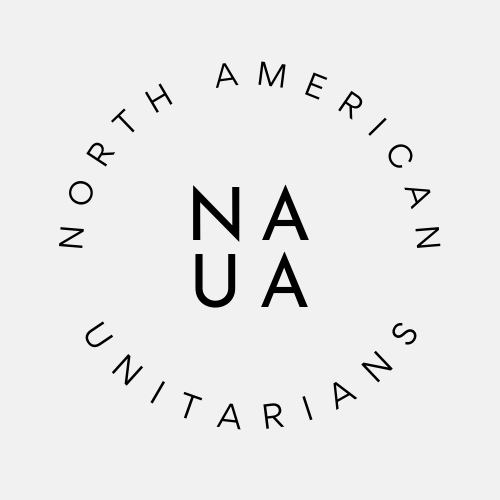Our History
The Unitarian Universalist Church of Spokane, first called the Spokane Unitarian Society, was established in 1887 by 20 founding members who began by meeting at the local Opera House. The society called its first minister, Rev. Edwin Wheelock a year later, in 1888. Wheelock came to Spokane from Virginia with a $15,000 bounty on his head, wanted dead or alive, for preaching a sermon in favor of abolitionist, John Brown. Spokane was still the Wild West at the time, with gunfights and stabbings occasionally occurring on its unpaved downtown streets. The church mostly supported itself by selling 25-cent lunches to local businessmen, charging a nickel per church meetings, and some additional fundraisers, all of which allowed it to soon purchase land and build a 275-seat meetinghouse.
Rev. John H. Dietrich became the Society’s minister in 1911, just a few months after being tried and convicted of preaching heresy by the Dutch Reform Church. Unlike his former denomination, the Spokane Unitarian’s were more than eager to be led by a heretic. According to its 1888 bylaws, after all, “The authority for its belief is reason; The method of finding its beliefs is scientific; Its aim is to crush superstition and establish facts of religion.” Within an atmosphere of such tremendous intellectual freedom and integrity, it is little wonder Dietrich first came to call himself a “Humanist” while in Spokane. Before his departure in 1916 he had an average weekly attendance of 800 or more eager to hear him speak. He went on to become a signer of the original Humanists Manifesto and is regarded as the founder of Religious Humanism. So it is no stretch to claim Humanism was born in our Spokane congregation.
Dietrich’s ministry was immediately followed by that of supply speaker, M. M. Mangasaria, a prominent rationalist, who, by some accounts, was even more popular than Dietrich. At the time he was especially known for his book The Truth about Jesus, in which he argued that Jesus was but a myth and no such person had ever lived. Given their tremendous popularity, Sunday services had to be held at the Clemmer Theatre (now The Bing), during the ministries of both men. After their departures, however, the numbers quickly dwindled to only a handful. For some, this was just fine given that the church had become more of a lecture series than a genuine faith community. Even so, by 1921 the congregation had difficulty sustaining itself and entered into a long period of “homelessness.”
For the next 15 years they struggled to maintain a Unitarian presence in Spokane, living on nickels and meeting wherever they could. As difficult a period as it was, they also did whatever they could to live out their progressive values. Records say they sponsored “a promising little deaf girl so she could attend the school for the deaf in Vancouver, Washington,” providing her with shoes, hats, and clothes throughout her education. During the Great Depression they spent years collecting and sending used clothes, shoes, bedding, and whatever else they could find, to the residents of Lewiston, Montana. They also held benefits to support the Social Service Bureau’s Baby Milk Fund, to help sick babies and mothers unable to burse, and to purchase books for the public library and furnishings for the YMCA.
Their period of “homelessness” ended in 1937 when they began meeting in the Temple Emanu-El, as space the Spokane Jewish community first shared and later gave to the Unitarians. In 1943 their numbers and finances were sound enough to purchase the Patrick Welch house, known today as the Glover Mansion, which remained their church home until they outgrew it and constructed the building they’ve been in since 1994.
During it’s more than 125 year history, the Unitarian Universalist Church of Spokane has been visited by individuals as Noteworthy as William Howard Taft, Booker T. Washington, and Margaret Sanger. During the 1950s and 60s, under the leadership of Rev. Rudy Gilbert, the church established a Public Affairs Committee for organizing public discussion of topics like Communism, the United Nations, Medicare. The committee also started several public service organizations like the Spokane Memorial Association, the Spokane Human Relations Council, a Tutor Aid program for struggling students, the Fair Housing Center, the Spokane chapter of the American Civil Liberties Union, Neighborhood centers that provided birth control counseling and information laying the ground work for a local Planned Parenthood office, along with other efforts for abortion reform laws in Washington, black–white dialogues, two regional social action conferences in conjunction with local universities, as well as continuing efforts to improve housing, education, and employment in our community. Rev. Gilbert himself was also an early, persistent, and vocal opponent of the Vietnam War.
After Gilbert, Rev. Dr. William H. Houff was called to the Unitarian Universalist Church of Spokane. “Bill” was a mystic, a scientist, a great orator, a people person, and an activist. Prior to coming to Spokane, he helped form the Redwood City Committee Against Napalm, and throughout his career remained active in organizations like the ACLU, the NAACP, the Sierra Club, the Washington Environmental Council, Planned Parenthood, Zero Population Growth, Amnesty International, the Center for Environmental Understanding, the Riverview Youth Center, and the Peace Justice Action League of Spokane, to name only familiar few. Most significantly, Houff used his background as a chemist to help prove radiation from the Hanford Nuclear Reservation was leaking into the ground, air, and water of communities in the region. Hanford is the plutonium manufacturing plant responsible for the bombs dropped on Hiroshima and Nagasaki and, at the time, remained the only active plutonium plant in the nation. Houff helped break news of the leak to the news media and, in 1984, delivered a sermon about the matter entitled “Silent Holocaust.” He also helped establish the Hanford Education Action League (H.E.A.L.), which created enough public concern and pressure to force the U.S. Department of Energy, which had previously denied there were any problems, to release 19-thousand pages of classified documents proving the Hanford plant was, indeed, contaminating the area with radiation that had leaked into the Columbia River, causing harm to thousands of people who lived far downriver and downwind from the actual site. In 1987, just three years after Silent Holocaust, the nuclear actor was shut down.
After Rev. Houff retired, near the end of the Cold War and the fall of the Eastern Bloc, Rev. Linda Whittenberg led the church in reestablishing relations with Unitarians in Eastern Europe, churches that had been closed off from the west for decades. Since 1991, the Unitarian Universalist Church of Spokane has been in a supportive partnership with a Unitarian Church of Felsőrákos in Romania, through cultural exchange, mutual visits, building friendships, and financially supporting its community.
In recent years, the Unitarian Universalist Church of Spokane has remained active in many other important issues of social justice. Just six months prior to the November 2012 election, the church partnered with the Westside Unitarian Universalist Congregation in Seattle to take out a local billboard campaign supporting Washington Referendum 74, in favor of marriage equality for gays and lesbians. The campaign rallied local faith leaders form a variety of traditions to appear in support of the Freedom to Marry, and has been attributed with helping to turn the 75 percent against Ref 74 just six months prior to the election, to a 47 percent approval, far more than the 40 percent necessary to help it win state wide, making Washington the first State in the nation to approve same-sex marriage by a popular vote.
That same year, UUCS also hosted a presentation by travel expert, Rick Steves, in support of Washington Initiative 502, which later passed, making marijuana legal to sale and possess throughout the State. Drug reform is part of the Church’s broader emphasis on criminal justice reform in general. It is a founding member and leader in the Smart Justice movement, seeking more productive, cost effective, evidence based solutions to crime and punishment.
In 2012 the church also held a capital campaign as part of our ongoing commitment to environmental justice. The funds raised allowed the congregation to make several energy efficient upgrades to its facilities, including installing a 75 panel solar array, the largest church solar array in the Pacific Northwest.
The Unitarian Universalist Church of Spokane has been making history for more than 125 years and remains committed to taking action now and in the future to help make our world a better and more just place for everyone.

